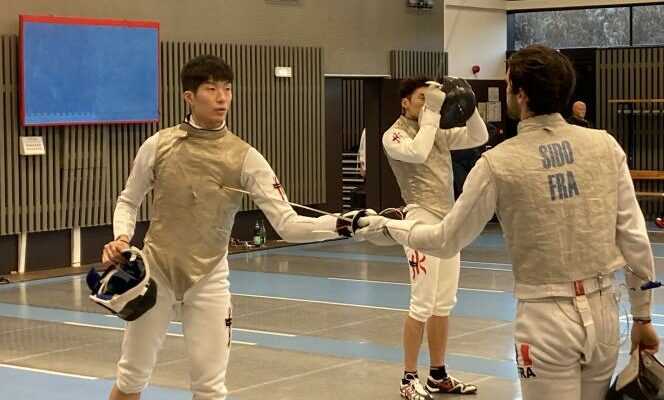At the end of the afternoon, the effervescence seized the weapons rooms of the Christian D’Oriola complex at the National Institute of Sport, Expertise and Performance (Insep), Monday February 7 in Paris. Everywhere, fencers are busy like bees in a hive. “Choi, give me five minutes to rest, thank you. [“Donne-moi cinq minutes pour me reposer, merci.”] », launches foil fencer Pierre Loisel to Hong Kong’s Ryan Choi.
With a sign, Cheung Ka Long, the individual Olympic foil champion, reserves the next attack for Frenchman Alexandre Sido. Another foil fencer from the French team, Maxime Pauty, is looking for a training partner among the Japanese shooters: “Are you alone? and you? [“Tu es seul ? et toi ?”] »
For the past few weeks, the foil teams from Hong Kong and Japan have been training with their French counterparts. Initially, their internship was to be limited to the preparation of the international challenge of Paris (from January 14 to 16). But the cancellation of the World Cup round in Turin (which was to take place from February 4 to 6) has disrupted plans. Impossible to return to the country before the next round scheduled in Cairo, at the end of February. In Hong Kong, a three-week sanitary isolation awaited the foilists.
A common specificity for the Hong Kongers and the Japanese has facilitated the extension of their stay in Paris: the two teams are trained by Frenchmen. Grégory Koenig takes care of the former British possession while the young retiree – Olympic team champion in Tokyo – Erwann Le Péchoux took charge of the collective of the host country of the last Olympic Games.
“Know other fencing”
When he learned that there would be no World Cup in Turin, Brice Guyart, president of the men’s foil commission of the French Fencing Federation, jumped at the chance to propose the organization of friendly competition. This test match will bring together, Friday, February 11 in Antony (Hauts-de-Seine), four teams, including two teams from France. “It is important to be able to vary the opposition. We have everything to gain by opening up”explains the double Olympic foil champion (in 2000 and 2004).
“The advantage of a course like that is that it allows you to break the routine and get to know other fencing, rejoices Emeric Clos, co-trainer of the Blues. And then it’s give and take. Soon they will invite us to their home. » In Antony, the fencing master will be able to test the youngest of his foil fencers and assess their behavior in the face of international opposition. Grégory Koenig confirms: “We really need opposition. We will be able to test some shooters. »
Since the start of the pandemic in 2020, fencers – like many athletes – have lived in a vacuum, or almost. Only three international competitions have taken place, including the Games. Cairo should be the fourth. The presence of foreigners in training is certainly not a substitute for competitions, but, as Tokyo team gold medalist, foil fencer Enzo Lefort points out: “In a combat sport where tactical adaptation is important, [elle] brings us diversity because they don’t have the same style of play as us at all. »
“We are lucky in France to have a very strong group. But we can tend to go around in circles when we are confronted almost exclusively with the same eleven other foil fencers,” he adds. Fourth in the Tokyo Olympics with the Japanese team, Kyosuke Matsuyama was able to measure himself during this Parisian stay against Enzo Lefort (1.90 m) or the Olympic champion Cheung (1.93 m), “much bigger and more powerful”. “I see that it is by remaining myself, with my style based on technique, that I can compete”he confides.
Stronger opposition
Having become a national icon – he won only the second gold medal in his country’s history – (the first was the work of windsurfer Lee Lai Shan in 1996), Cheung Ka Long, 24, is not afraid not to reveal its secrets by training for a month with future opponents. “Even if you know how I practice my fencing, I can change it during the match”he affirms, recognizing all the interest of benefiting from a more extensive opposition than in his country: “Yes, I’m an Olympic champion, but sometimes I’m bad. And I have to identify my weak points and keep improving. »
New leader of the Blues since the departure of Erwann Le Péchoux, Enzo Lefort shares Cheung’s point of view: “I don’t think it makes a difference to put myself in a corner and take notes on my opponents. » On the other hand, shooting more often against the atypical style of “this great left-hander with a rare change of pace” can only benefit him. “In training, I won once and lost once. And he beat me in the Paris challenge”he adds.
Often decried, the exodus of French coaches abroad does not worry fencers, like Lefort. Even when it comes to the one who was ten years during his partner in the France team. “Erwann knows me by heart, that’s for sure. But the Japanese already have their style. He’s not going to revolutionize their game. They have their own conception of fencing.”he says.
“I’m not here to tell my foil fencers “You have to do this or this against such and such an opponent.confirms Erwann Le Péchoux, whose first advice to his new protege Kyosuke Matsuyama was to keep his identity.
Long the preserve of countries such as France, Italy, Hungary or Russia, fencing has become globalized at breakneck speed. International exchanges have intensified. “It’s complicated to talk about a Hong Kong style. Each fencer has his own style. Even in France, not all fencers shoot the same wayexposes Cheung Ka Long, the Tokyo sensation. That’s why fencing is so interesting. »
